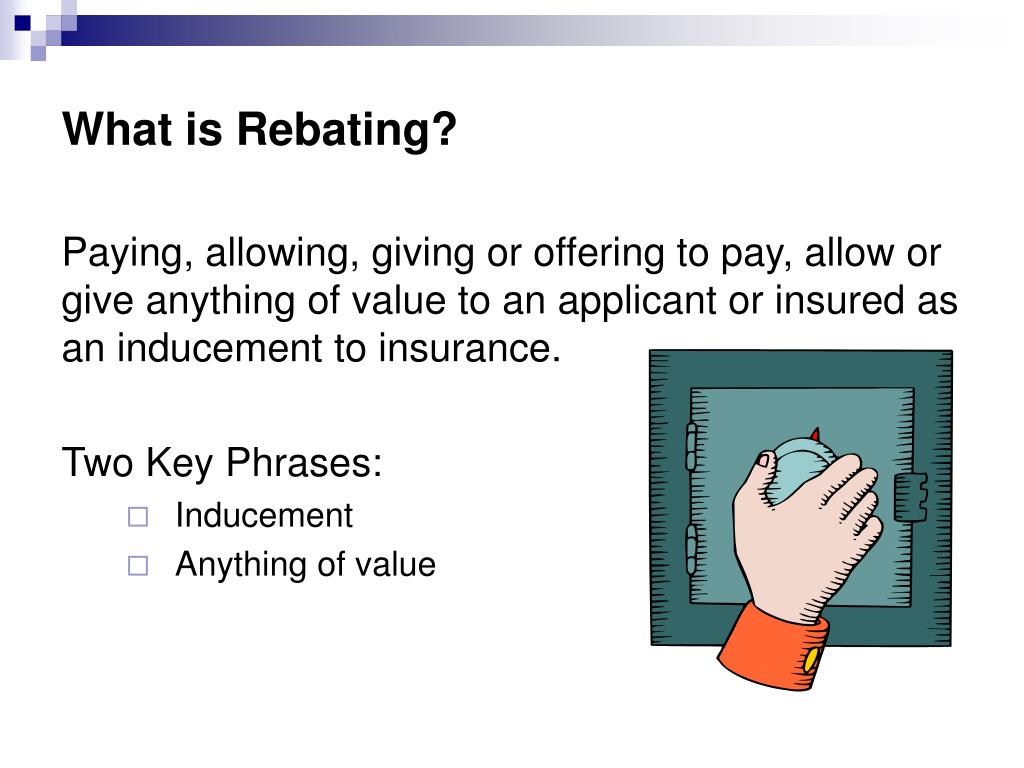Definition of Rebating
In insurance, rebating refers to the illegal practice of an insurance agent or broker providing a portion of their commission or fees back to the policyholder. This is done to incentivize the policyholder to purchase or renew a policy with that particular agent or broker.
Rebating is strictly prohibited in the insurance industry, as it undermines the integrity of the market and can lead to unfair competition. Insurance regulators have implemented strict rules and regulations to prevent rebating, and agents or brokers who engage in this practice can face severe penalties, including fines, license suspensions, or even criminal charges.
Consequences of Rebating
Rebating can have several negative consequences for the insurance industry, including:
- Undermining the integrity of the market: Rebating can create an unfair advantage for agents or brokers who engage in this practice, as they can offer lower premiums or other incentives to policyholders that other agents or brokers cannot match.
- Reducing competition: Rebating can discourage new agents or brokers from entering the market, as they may not be able to compete with established agents or brokers who are willing to rebate.
- Harming consumers: Rebating can ultimately harm consumers, as it can lead to higher insurance premiums and reduced coverage options.
Types of Rebating
Rebating practices can be categorized into different types based on their characteristics and implications.
One common type of rebating is direct rebating, where the agent or broker returns a portion of the commission or premium to the policyholder in the form of cash or other benefits. This practice is often used to attract new customers or retain existing ones.
Indirect Rebating
Another type of rebating is indirect rebating, which involves providing non-monetary benefits to the policyholder in exchange for their business. This could include free gifts, travel vouchers, or other perks.
Indirect rebating can be more difficult to detect than direct rebating, as it does not involve the exchange of cash. However, it can still be considered a violation of insurance regulations and can have similar consequences.
Impact of Rebating
Rebating can have significant consequences for both consumers and insurance companies.
Impact on Consumers
Consumers may be tempted by the prospect of lower premiums, but rebating can lead to several negative outcomes:
– Reduced Coverage: Agents may incentivize consumers to purchase policies with lower coverage limits or fewer benefits to maximize their commissions. This can leave consumers financially vulnerable in the event of a claim.
– Higher Out-of-Pocket Costs: While consumers may save on premiums, they may end up paying more out-of-pocket for deductibles, copays, and other expenses if they have inadequate coverage.
– Unfair Treatment: Rebating can create an uneven playing field, where consumers who purchase through agents who engage in rebating receive preferential treatment over those who do not. This can undermine consumer confidence in the insurance industry.
Impact on Insurance Companies and the Industry
Rebating can also have detrimental effects on insurance companies and the industry as a whole:
– Financial Losses: Insurance companies may lose revenue due to reduced premiums, impacting their profitability and ability to pay claims.
– Reputational Damage: Rebating can damage the reputation of the insurance industry, leading to decreased consumer trust and increased regulatory scrutiny.
– Market Distortion: Rebating can create an unfair competitive advantage for agents who engage in the practice, distorting the market and making it difficult for honest agents to compete.
Legality and Regulations
Rebating is generally prohibited by law in most jurisdictions. Regulatory bodies, such as insurance commissions and departments, have established strict guidelines to prevent unfair competition and protect consumers.
Penalties and Enforcement
Violations of rebating laws can result in severe penalties, including:
– Fines
– License suspension or revocation
– Criminal charges
– Civil lawsuits
Insurance regulators actively enforce these regulations through investigations, audits, and disciplinary actions. They work closely with law enforcement agencies to prosecute individuals or entities involved in rebating schemes.
Ethical Considerations
Rebating raises ethical concerns as it involves a conflict of interest between the agent and the client. Insurance agents have a fiduciary responsibility to act in the best interests of their clients. Rebating compromises this responsibility as the agent may prioritize their own financial gain over the client’s needs.
Potential Conflicts of Interest
- Undue Influence: Rebates can create a power imbalance between the agent and the client. The client may feel obligated to purchase a policy from the agent due to the financial incentive, even if it is not the best option.
- Misrepresentation of Benefits: Agents may downplay the risks or exaggerate the benefits of a policy to justify the rebate. This misrepresentation can lead to the client making uninformed decisions.
Best Practices for Preventing Rebating
Insurance companies and agents have a responsibility to uphold ethical practices and prevent rebating. Implementing best practices is crucial to maintain the integrity of the insurance industry and protect consumers from unfair practices.
Transparency and accountability play vital roles in combating rebating. Insurance companies should establish clear policies and procedures prohibiting rebating and ensuring compliance among agents.
Transparency and Accountability
- Clear Policies and Procedures: Establish comprehensive guidelines outlining the prohibition of rebating and the consequences of non-compliance.
- Regular Audits and Monitoring: Conduct regular audits and monitoring to detect any instances of rebating and take appropriate disciplinary action.
- Agent Education and Training: Provide agents with thorough training on rebating laws and regulations, emphasizing the ethical and legal implications.
Agent Responsibility
- Ethical Conduct: Agents should adhere to the highest ethical standards and avoid any actions that could constitute rebating.
- Disclosure of Commissions: Agents must clearly disclose their commissions to clients, ensuring transparency and preventing misunderstandings.
- Focus on Client Needs: Agents should prioritize the needs of their clients over personal financial gain and avoid any practices that could compromise client interests.
Case Studies

Rebating cases have been prevalent in the insurance industry, leading to significant consequences for individuals and companies involved. Here are some notable examples:
Legal Cases
- In 2016, a California insurance agent was sentenced to 10 years in prison for orchestrating a $1.5 million rebating scheme. The agent paid kickbacks to insurance brokers in exchange for directing clients to his agency.
- In 2018, a Florida insurance company was fined $2 million for rebating to insurance agents. The company provided commissions and bonuses to agents who sold policies with lower premiums, violating state regulations.
Impact on the Insurance Industry
Rebating practices have several negative impacts on the insurance industry:
- Unfair competition: Rebating creates an uneven playing field for insurance agents and companies who do not engage in such practices.
- Higher insurance premiums: Rebating can lead to higher insurance premiums for consumers, as insurers may pass on the cost of kickbacks to policyholders.
- Loss of trust: Rebating undermines the trust between insurance companies, agents, and consumers, damaging the industry’s reputation.
International Perspectives
Rebating in insurance is a global issue with varying regulatory approaches and industry practices.
Cross-country comparisons reveal differences in the severity of the problem, enforcement mechanisms, and industry self-regulation. Some countries have strict anti-rebating laws, while others have more lenient regulations.
Regulatory Approaches
– Some countries have adopted strict anti-rebating laws that prohibit any form of commission sharing or inducements between insurers and agents.
– Other countries have more flexible regulations that allow for limited commission sharing under certain conditions.
– The effectiveness of these regulations depends on the enforcement mechanisms in place.






